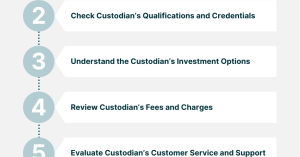Invest in Alternative Assets with a Self-Directed IRA
Summary
- A self-directed IRA allows you to invest in alternative assets beyond stocks and bonds, such as real estate, precious metals, cryptocurrencies, and private equity.
- Traditional IRAs offer tax-deductible contributions and tax-deferred growth, while Roth IRAs offer tax-free growth and tax-free withdrawals in retirement.
- To open a self-directed IRA, you need to find a custodian bank that allows alternative asset investments, complete their application process, and fund your account.
- Investing in alternative assets can provide potential for enhanced returns, diversification, and tax advantages, but it's important to understand the risks, liquidity concerns, IRS rules, and withdrawal strategies.
Diversify your investment portfolio and explore new financial opportunities by harnessing the power of a Self-Directed IRA to invest in alternative assets.

Introduction to Self-Directed IRAs

Invest in alternative assets with a self-directed IRA and take control of your retirement investments. With a self-directed IRA, you have the flexibility to invest in a wide range of assets beyond traditional options like stocks and bonds. This includes alternative investments such as real estate, precious metals like gold and silver, cryptocurrencies like Bitcoin and Ethereum, and even private equity and startup companies. By diversifying your portfolio with these alternative assets, you can potentially increase your returns and reduce your risk. It's important to note that self-directed IRAs require regulatory compliance and must be managed by a custodian bank.
Consult with a financial adviser to understand the tax advantages and potential risks associated with self-directed IRAs. Take charge of your retirement and explore the world of alternative investments with a self-directed IRA.
Traditional vs. Roth Options
| Traditional IRA | Roth IRA |
|---|---|
| Contributions are made with pre-tax dollars, reducing your taxable income | Contributions are made with after-tax dollars, so they are not tax-deductible |
| Earnings grow tax-deferred, but withdrawals in retirement are taxed as ordinary income | Earnings grow tax-free and qualified withdrawals in retirement are tax-free |
| Required Minimum Distributions (RMDs) must be taken starting at age 72 | No RMDs during the account holder's lifetime |
| Income limits may restrict your ability to contribute or deduct contributions | No income limits for contributions, but income limits apply for deductions |
| Investment options limited to stocks, bonds, mutual funds, and other traditional assets | Investment options include stocks, bonds, mutual funds, and alternative assets like real estate, precious metals, private equity, etc. |
| Early withdrawals before age 59½ may be subject to a 10% penalty in addition to regular income tax | Contributions can be withdrawn penalty-free at any time, but earnings may be subject to penalty if withdrawn before age 59½ |
| Ability to deduct contributions from taxes can provide immediate tax savings | No immediate tax savings, but tax-free growth can provide long-term benefits |
Opening an Account
To open an account for investing in alternative assets with a self-directed IRA, you'll first need to find a custodian bank that allows this type of investment. Research different custodians and compare their fees, services, and regulatory compliance. Once you've selected a custodian, complete their account application and provide the necessary documentation. Next, fund your self-directed IRA by transferring funds from an existing traditional IRA or SEP-IRA, or by making a direct contribution. Once your account is funded, you can start investing in a variety of alternative asset classes such as gold, cryptocurrency, real estate, or startups.
Real Estate Opportunities
Real estate offers lucrative investment opportunities that can be pursued through a Self-Directed IRA. With a Self-Directed IRA, investors have the freedom to choose alternative assets, such as real estate, to diversify their portfolio and potentially increase returns. This allows individuals to invest in properties like residential homes, commercial buildings, or even land. By utilizing a Self-Directed IRA, investors can take advantage of tax benefits and potentially grow their wealth while safeguarding their retirement funds. It is important to consult with a financial advisor who specializes in Self-Directed IRAs to ensure compliance with IRS regulations and maximize the benefits of real estate investments within this retirement account structure.
Precious Metal Possibilities
Investing in alternative assets can provide a unique avenue for diversification and potential growth. One option to explore is a Self-Directed IRA, which allows individuals to invest in a variety of alternative assets, including precious metals like gold and silver. These metals have a long history of being valued as a hedge against inflation and economic uncertainty. With a Self-Directed IRA, investors can hold physical bullion or invest in exchange-traded funds (ETFs) that track the price of precious metals.
By including precious metals in your investment portfolio, you can potentially reduce risk and protect against market volatility. Consult with a financial adviser to learn more about the tax advantages and potential benefits of investing in precious metals through a Self-Directed IRA.
Cryptocurrency Inclusion

Cryptocurrency inclusion is an essential aspect of investing in alternative assets with a self-directed IRA. By diversifying your portfolio to include digital currencies like Bitcoin and Ethereum, you can capitalize on the potential growth and opportunities offered by this emerging market. With a self-directed IRA, you have the freedom to invest in a wide range of assets beyond traditional options like stocks and bonds. This includes alternative investments such as gold, precious metals, and even real estate. By leveraging the tax advantages of a self-directed IRA, you can potentially grow your investments while deferring taxes on any income or gains. Take advantage of this opportunity to explore new asset classes and potentially boost your retirement savings.
SEP IRAs Explained
SEP IRAs, or Simplified Employee Pension IRAs, are a type of retirement account that allows self-employed individuals and small business owners to save for retirement. With a SEP IRA, individuals can contribute a percentage of their income, up to a certain limit, and these contributions are tax-deductible. One of the key advantages of a SEP IRA is the ability to invest in alternative assets, such as gold, real estate, or even start-up companies, through a self-directed IRA. This allows investors to diversify their retirement portfolio and potentially achieve higher returns.
SIMPLE IRAs Uncovered
Investing in alternative assets with a Self-Directed IRA can provide you with unique opportunities to diversify your portfolio and potentially earn higher returns. With a Self-Directed IRA, you have the ability to invest in a wide range of assets beyond traditional options like stocks and bonds. This includes **alternative investments** such as real estate, precious metals like **gold**, and even **crowdfunding** opportunities. By expanding your investment options, you can potentially reduce risk and increase potential rewards. Additionally, investing in alternative assets with a Self-Directed IRA may offer **tax advantages** such as tax deferral or even tax exemption, depending on the asset and your specific circumstances. Take advantage of the flexibility and potential benefits of a Self-Directed IRA to build a more diversified and potentially lucrative investment portfolio.

Advantages Overview
Investing in alternative assets with a self-directed IRA offers numerous benefits. One key advantage is the ability to diversify your portfolio beyond traditional investments like stocks and bonds. With a self-directed IRA, you can invest in alternative assets such as gold, real estate, private placements, and more.
Another advantage is the potential for tax advantages. Depending on the type of self-directed IRA you choose, you may be eligible for tax deferral or even tax-exempt growth. This can help maximize your investment returns and reduce your overall tax liability.
Furthermore, investing in alternative assets with a self-directed IRA allows you to take control of your retirement savings. You have the freedom to choose the investments that align with your goals and risk tolerance, rather than relying on a financial planner or traditional retirement account.
Potential for Enhanced Returns
Investing in alternative assets through a Self-Directed IRA can provide the potential for enhanced returns. By diversifying your portfolio beyond traditional investments like stocks and bonds, you can take advantage of opportunities in areas such as real estate, precious metals, and startups. These alternative assets have the potential to generate higher returns compared to more conventional options. With a Self-Directed IRA, you have the flexibility to invest in a wide range of assets, giving you the ability to tailor your investments to your specific goals and risk tolerance. Additionally, investing in alternative assets through a Self-Directed IRA can offer tax advantages, such as tax-deferred or tax-free growth, depending on the type of account.
Consider exploring alternative assets with a Self-Directed IRA to potentially enhance your investment returns.
Benefits of Diversification
Diversification is a key benefit of investing in alternative assets with a Self-Directed IRA. By diversifying your portfolio, you can spread out your investments across different asset classes, such as real estate, precious metals, or private equity. This helps to mitigate risk and potentially increase returns. With a Self-Directed IRA, you have the flexibility to invest in a wide range of alternative assets, including gold, foreign exchange, crowdfunding, and more.
Additionally, investing in alternative assets with a Self-Directed IRA can provide tax advantages, such as tax exemptions or deductions. By diversifying your investments, you can protect yourself from market volatility and potentially achieve long-term financial goals.
Understanding Risks and Disadvantages
Investing in alternative assets with a Self-Directed IRA can offer unique opportunities, but it's important to be aware of the potential risks and disadvantages.
One risk to consider is the volatility of certain alternative investments, such as gold or foreign exchange markets. These assets can experience significant price fluctuations, which may impact your investment returns.
Another disadvantage is the potential lack of liquidity in alternative investments. Unlike stocks or bonds, which can be easily bought or sold, alternative assets may have longer holding periods or limited buyers and sellers.
Additionally, it's crucial to understand the tax implications of investing in alternative assets with a Self-Directed IRA. While there may be tax advantages, such as tax exemptions or deductions, it's important to consult with a financial planner or tax professional to ensure compliance with IRS regulations.
Lastly, be cautious of potential fraud or scams when considering alternative investments. Conduct thorough research, verify the credibility of the investment opportunity, and be wary of any promises of high returns with little risk.
Investing in alternative assets can be a valuable addition to your retirement portfolio, but it's essential to be fully informed about the risks and disadvantages involved.
Liquidity Concerns
When investing in alternative assets with a Self-Directed IRA, it's important to consider liquidity concerns. Unlike traditional investments like stocks and bonds, alternative assets may not be as easily converted to cash. Gold IRA and exchange-traded funds offer some liquidity, but other alternatives like real estate or private placements can be more illiquid.
It's crucial to assess your financial goals and timeline before investing in alternative assets. Consider the potential risks and rewards, as well as the tax advantages and income tax implications.
Diversifying your portfolio with alternative investments can be a smart move, but be mindful of the potential liquidity challenges. It's advisable to consult with a financial advisor or tax professional to ensure you make informed investment decisions that align with your overall financial strategy.
IRS Rules and Protections

When investing in alternative assets with a Self-Directed IRA, it is important to understand the IRS rules and protections that apply. These rules are in place to ensure compliance and protect investors from fraudulent activities. By familiarizing yourself with these regulations, you can make informed investment decisions and maximize your tax advantages.
Some key rules and protections include:
1. Prohibited transactions: The IRS prohibits certain transactions to prevent self-dealing and conflicts of interest. It is important to understand what transactions are considered prohibited to avoid penalties and potential disqualification of your IRA.
2. Tax advantages: Investing in alternative assets with a Self-Directed IRA can provide tax advantages, such as tax-deferred or tax-free growth. Understanding these benefits can help you make strategic investment decisions.
3. Reporting requirements: As with any investment, it is important to comply with IRS reporting requirements. Keeping accurate records and reporting your investments correctly ensures compliance and prevents potential issues with the IRS.
By adhering to the IRS rules and protections, you can confidently invest in alternative assets using a Self-Directed IRA and take advantage of the tax benefits these investments offer.
Prohibited Transactions
When investing in alternative assets with a Self-Directed IRA, it's important to be aware of prohibited transactions. These transactions involve using your IRA funds for personal gain or engaging in certain transactions that could result in penalties. Examples of prohibited transactions include using your IRA to purchase a vacation home for personal use or lending money from your IRA to yourself or a family member. It's crucial to understand and follow the rules outlined by the Internal Revenue Service (IRS) to avoid any potential penalties or loss of tax advantages.
Consulting with a qualified financial advisor can help ensure compliance and maximize the benefits of your Self-Directed IRA.
Withdrawal Strategies

When investing in alternative assets with a Self-Directed IRA, it's crucial to have a solid withdrawal strategy in place. This ensures that you can reap the benefits of your investments while minimizing taxes and penalties.
One important strategy is to consider diversification. By spreading your investments across different asset classes such as gold, exchange-traded funds, and mutual funds, you can reduce the risk associated with any one investment.
Additionally, understanding the tax advantages of specific assets, such as precious metals or tax-exempt securities, can help you make informed decisions.
Consider factors like income tax rates and potential tax exemptions when determining your withdrawal strategy.
Finally, consult with a financial advisor or tax professional to ensure your chosen strategy aligns with IRS regulations and maximizes your returns. With careful planning and consideration, your Self-Directed IRA can provide a secure and profitable retirement plan.
Alternatives to Self-Directed IRAs
Looking for alternatives to self-directed IRAs? Consider investing in alternative assets with a self-directed IRA. With a self-directed IRA, you have the freedom to invest in a wide range of assets beyond traditional stocks and bonds. Some popular alternative investment options include gold, exchange-traded funds (ETFs), foreign exchange markets, precious metals like bullion, and even real estate.
These alternative assets can provide diversification and potential tax advantages. Keep in mind that there are certain rules and regulations that must be followed when investing in alternative assets with a self-directed IRA, so it's important to consult with a knowledgeable financial advisor or tax professional. Explore the possibilities and discover new ways to grow your retirement savings.
Gold IRA: Should You Open One To Save For Retirement?


